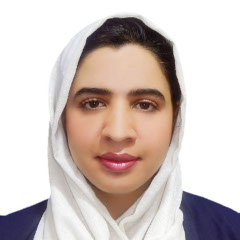Aqsa Shafique, PhD Student, Department of Health Sciences

Dr. Aqsa Shafique is a second year PhD student at the University of York. She holds a Bachelor of Medicine and Bachelor of Surgery from Combined Military Hospital, Lahore Pakistan. Following which she pursued a Master of Science in Public Health from the Health Services Academy, Islamabad, Pakistan. She has served as Assistant Director at CMH Lahore Medical College. Mental Health, especially depression & anxiety, health education/promotion and innovation in health, as well as medical education are a few areas that interest her the most. Dr. Aqsa Shafique's PhD thesis focuses on adolescent mental health, specifically addressing depression and anxiety in Pakistani adolescents.
Email: ncc541@york.ac.uk
Our 60-second interview with Aqsa:
Could you please tell us what work you do in the field of mental health?
I am passionate about enhancing adolescent mental health through in-depth research that explores the causes and impacts of anxiety and depression. Currently, I’m leading an epidemiological study and a systematic review that investigates how social and environmental factors shape young people's mental well-being. My aim is to uncover valuable insights that can drive practical solutions and improve support systems for adolescents in need.
What do you find most rewarding and inspiring in this work?
The most rewarding part of my work is knowing that my research can lead to real changes in the lives of young people facing mental health challenges. I’m inspired by the idea that my findings can help create better access to mental health resources, enabling adolescents to overcome difficulties and thrive.
What is the most challenging or complicated aspect of this work?
One of the challenges in my work is navigating the sensitive landscape of adolescent mental health. Many young people are hesitant to share their struggles, so it is essential to approach their experiences with compassion and understanding. The sheer scale of mental health issues faced by adolescents demands bold, innovative solutions and substantial resources. This complexity requires us to consider the many social and environmental influences at play, making my work both crucial and multifaceted.
What impact do you hope your work is having - or can potentially have?
I hope my work will lead to meaningful changes in how we support adolescents facing mental health issues. My ultimate goal is to establish an institution dedicated to preventive mental health solutions, focusing on early interventions that make it easier for young people to access the help they need.
Could you share with us one piece of advice that you follow for your own mental health?
One piece of advice I follow is to set clear boundaries between work and personal time. This practice allows me to recharge, maintain focus, and stay grounded, which is essential in balancing the demands of both professional and personal life. I tend to engage myself in activities around my personal life that excite me and have a positive impact on my wellbeing.
